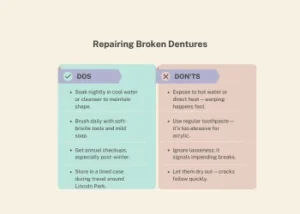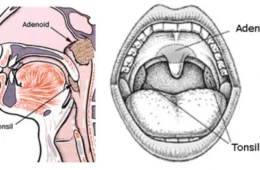
Breaking your dentures can feel overwhelming, especially during a busy Chicago winter when slips on icy sidewalks in Lincoln Park or Lakeview add extra stress. Take a deep breath—we’re here to guide you. You restore confidence quickly with the right steps. Remember, your smile matters, and professional care keeps it shining.
Why Do Dentures Break?
Dentures break for simple reasons, often tied to daily wear and Chicago’s harsh weather. Dry winter air shrinks gum ridges, loosening the fit and increasing fracture risk. Accidental drops during rushed mornings or evening routines in Lakeview’s cozy homes also play a role.
Common Causes of Broken Dentures
- Wear and tear over time: Gums change shape, stressing the denture base.
- Improper storage: Leaving them dry overnight warps the material.
- Accidents: Drops or bites into hard foods like winter nuts.
- Poor fit from lack of checkups: Skipping annual visits lets small issues grow.
Spot these early to prevent heartbreak. Schedule routine exams to catch shifts before they snap.
Immediate Steps: What to Do Right Now
Act fast, but stay calm. Rinse the pieces gently under cool water to remove debris. Avoid hot water—it warps acrylic fast. Place fragments in a soft cloth-lined container with cool water or a denture-soaking solution. This preserves shape until help arrives.
Never force pieces together. Skip eating tough foods; opt for soft options like soups to ease discomfort. Call your dentist immediately—delays worsen fits and health.
In Chicago’s cold months, wrap your container in a towel for transport. Lakeview’s quick Ubers make reaching care simple.
Why Skip DIY Denture Repairs?
You might grab a home kit in panic, but experts warn against it. Glues and kits damage acrylic, irritate gums, and misalign bites—leading to sores, infections, or even bone loss. One wrong move turns a quick fix into costly replacement.
Professionals use precise tools for lasting results. Trust science over shortcuts. Your mouth deserves better.
For reliable advice, check the American Dental Association’s denture care guide.
The Professional Repair Process
Dentists assess the break first, then clean and realign pieces under lab conditions. They reline or rebase if needed, ensuring a snug fit. Most repairs take 24-48 hours, but rush services help in emergencies.
At EliteFixDenture.com, Dr. Aziz Liaquat excels in implant dentistry, including seamless denture repairs, extractions, and implants for long-term stability. His expertise turns worry into relief.
Follow-up visits confirm comfort. Proper care extends denture life up to seven years.
Prevention Tips for Chicago Winters
Chicago’s dry winds and indoor heating challenge dentures. Stay ahead with these habits:
| Do’s | Don’ts |
| Soak nightly in cool water or cleanser to maintain shape. | Expose to hot water or direct heat—warping happens fast. |
| Brush daily with soft-bristle tools and mild soap. | Use regular toothpaste—it’s too abrasive for acrylic. |
| Get annual checkups, especially post-winter. | Ignore looseness; it signals impending breaks. |
| Store in a lined case during travel around Lincoln Park. | Let them dry out—cracks follow quickly. |
These steps shield against Lakeview’s chilly blasts. Brush gums too for overall health.
For more on maintenance, visit Cleveland Clinic’s denture care overview.

Mini FAQ: Broken Dentures Quick Answers
Q: Can I eat with broken dentures?
A: Stick to soft foods like yogurt or mashed potatoes. Avoid chewing on the damaged side to prevent further injury.
Q: How long does a professional repair take?
A: Typically 1-2 days, but emergency options speed it up for Chicago folks.
Q: Will my insurance cover denture repairs?
A: Many plans do—check yours or ask your provider for details.
Q: How often should I replace dentures?
A: Every 5-7 years, or sooner if your mouth changes.
Q: What if my dentures cause sores after a break?
A: See your dentist ASAP; they adjust for comfort and check for infections.
Q: Are there winter-specific tips for denture care?
A: Yes—use a humidifier indoors to combat dry air that loosens fits.
Q: Can I prevent breaks during travel?
A: Pack in a protective case and avoid baggage holds.
Q: What’s the first sign of trouble?
A: Looseness or clicking—address it early with a pro.
This guide offers general information only and isn’t medical advice. Consult a dentist for personalized care.
For expert dental care in Chicago, visit EliteFixDenture.com. Schedule today—your smile awaits!
Reviewed by Dr. Aziz Liaquat, Implant Dentistry






Comments (4)
Can You Use Super Glue to Fix Dentures? Safe Repair Tips
[…] How do I store broken dentures until my […]
How to Use Denture Adhesive to Securely Fix Your Dentures
[…] Q: Can denture adhesive fix broken dentures? […]
Denture Fracture Repair Chicago | Same-Day Fixes
[…] I Fix Broken Dentures at […]
Denture Repair Kits: Types, Safe Use, Costs & Expert Tips
[…] urge skipping DIY kits for breaks. “Don’t try to fix broken dentures using over-the-counter repair kits or glue. You may irreparably damage the appliance,” warns […]